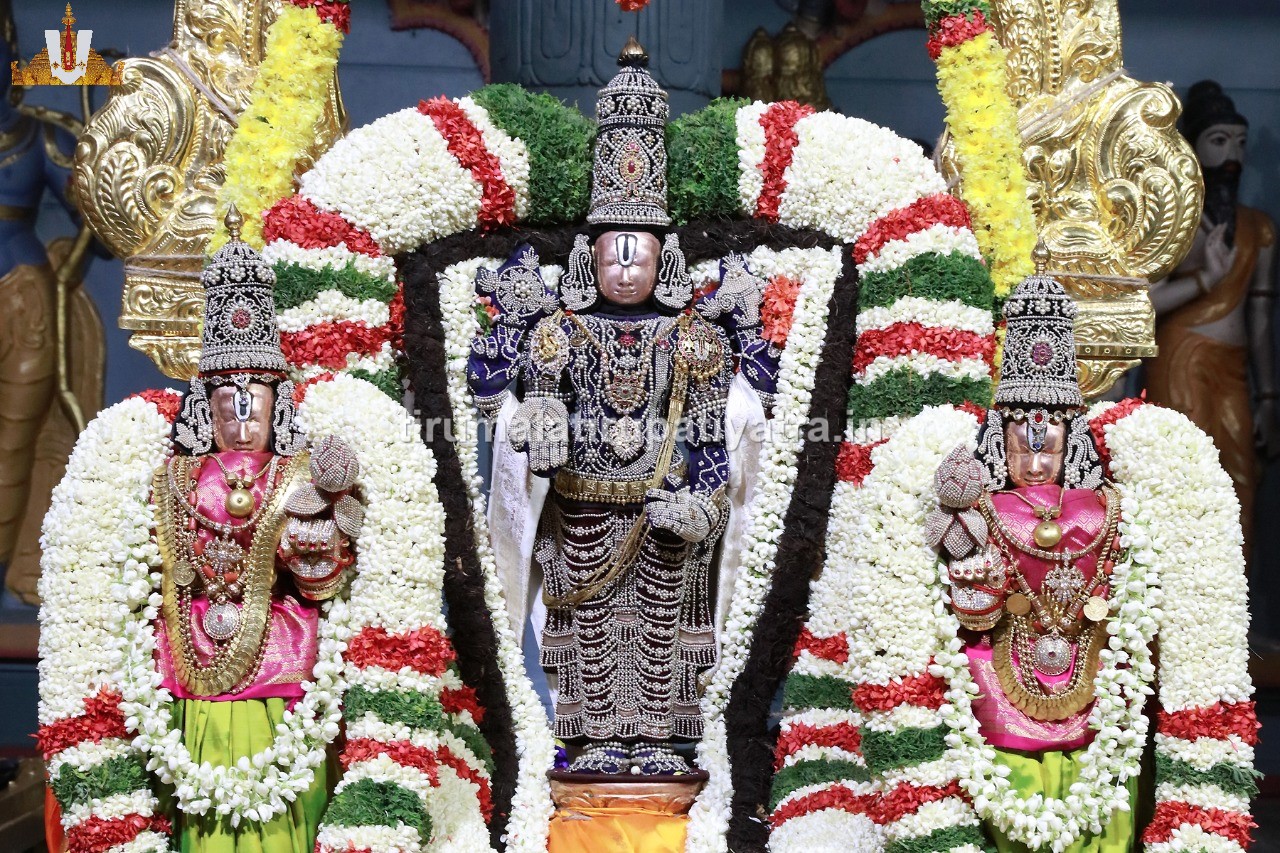Lord Maha Vishnu
All the Vedas unanimously declare that Lord Vishnu is prominent among the Vedic Gods. Agni is considered to be the last and Mahavishnu the Highest.
Lord Vishnu is eulogized as one who demonstrated the celebrated three strides (Vikrama) Trivikrama and consequently acquired the honorific name as Trivikrama throughout Vedic literature, He is figuratively mentioned as the sacrifice itself ‘Yagno Vaivishnuh’ which categorically signifies that He is the Supreme Deity to be propitiated.
Everywhere He is much praised for His extreme goodness of disposition towards His devotees and acknowledged as the only deity who pervades, preserves, and controls the whole universe.
The Vedas (Samhitas and Brahmanas) enumerate Vishnu as one of the important deities. The later portions namely the Upanishads and Vedantas identify Him with Parabrahman, the life-giving and life-sustaining center which is responsible for the evolution (sristi) preservation (sthithi), and involution (laya) of the entire Universe.
The terms Vishnu and Brahman are synonymous by their respective deviations. Brahman means that which is un-surpassingly great in form possession of virtues and Vishnu connotes that which is all pervading. That the terms Vishnu and Brahman are synonymous can be evidenced by the concluding aphorisms of Devata kanda of Kasa Krishna.
Brahman is characterized as Satyam Jnanam and anantam and the characteristics of all pervasiveness connected by the term Vishnu is indicated by the attribute anantam which means freedom from the limitations of time, space, and conditions.
Lord Vishnu held in high esteem and special emphasis held or laid that the ultimate goal of human life reaches the supreme abode of Lord Vishnu where eternally unbound souls (suris or nitya suris) see Him and enjoy Him.
(Tadvisho paramapadam). In the ultimate chapters of the Vedas, Lord Vishnu who is identical with Brahman is characterized as the highest personality equal to whom and higher than whom there is nothing. He is inseparably related to the Universe (Jagat) consisting of the animate and the inanimate (chetana and Achetana). The Universe is considered to be His body (Sarira) of which He is the only Soul (Saririn).
Thus it can be deduced that every entity that attains the characteristic of substances (Vastutva) is God-filled and that the import conveyed by that Vastu shall primarily mean Him as He is the owner of the world (Isavasyamidam Sarvam).
It is with careful study of the Upanishads about the significance of words and their imports our forefathers have wisely named us Krishna, Gopala, Srinivasa, Ranganatha or Venkatesa to make us realize at every step that the individual soul which has no individuality without Him should be named after Him who is the real owner of all the animate and inanimate.
Vishnu who is identified with Brahman is again identified with Srimanarayana, who is the abode or resting place of men. One of the Rigvedic texts declares that He is one with Sri or Lakshmi and that Brahman signifies dual deity or Divya dampathi or divine couple.
Srimannarayana who is supposed to manifest Himself in fivefold modes such as para, vyuha, vibhava Antaryami, and Archa, has assumed His archa mode in this attractive resplendent, blissful, and auspicious form and stationed Himself on the peak of Sesha hill to be visible to one and all.
Lord Vishnu is considered to be the Lord of all mountains and this is the reason why he selected this sacred hill for His abode (Vishnuhu Parvatanam Adhipathihi). click here for seven hills.
It is stated in Venkatachala mahatmyam that para manifestation of the Lord is shifted to His Sankalpa to the terrestrial world (Mayavee Paramanadam Tyaktva Vaikuntamuthamam) It is also stated that Lord Krishna roamed about on this hill (Evam Sri Krishna rupena kreeditam venkatachala).
The Lord on the hill is Srimannarayana or Lord Vishnu who though all pervasive assumes a loveable and beautiful form to manifest His Divinity in this Kaliyuga by removing the afflictions of His Devotee and granting boons to the extent of attaining Him in His abode which is Kaliyuga Vaikuntam or Parampada.
He is the only Lord to Protect His devotees and save them from all difficulties. Devotees throng to Lord Srinivasa at Tirumala temple, and day by day the rush of the devotees increases as He calls them to have His Blessings and redeem them from all types of Bondage.
*Source: Saptagiri Magazine

